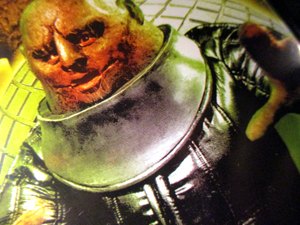The Time Warrior
“These wizards and warlocks were ever a treacherous breed. We’d best be wary of him” – Lady Eleanor, of the Doctor
 In an amazing script by Robert Holmes, the engaging storyline is very neatly presented and moves at a brisk pace but above all contains some of the richest dialogue of the whole era. The speech of the medieval characters is flowery and olden but nevertheless flows naturally. Every witty reply, raging insult, and earnest conversation is sparkling. Irongron is such a great character—a petty man pursuing his petty goals, obviously brash and bold to hide his lack of intellect, and yet so self-confident that he doesn’t know to be afraid of an obvious alien menace. (It’s is mine—Irongron’s star! I will have it!) The interplay between him and his doggedly loyal lackey Bloodaxe is classic Holmes. The equally arrogant Linx is disparaging of Irongon’s lowliness but his supposed superiority is humorously and ironically undercut when we hear both him and Irongron mutter to themselves in parallel: “Insolent primitives! Did I not need their aid…/ Insolent barbarian! Did I not need his help…”
In an amazing script by Robert Holmes, the engaging storyline is very neatly presented and moves at a brisk pace but above all contains some of the richest dialogue of the whole era. The speech of the medieval characters is flowery and olden but nevertheless flows naturally. Every witty reply, raging insult, and earnest conversation is sparkling. Irongron is such a great character—a petty man pursuing his petty goals, obviously brash and bold to hide his lack of intellect, and yet so self-confident that he doesn’t know to be afraid of an obvious alien menace. (It’s is mine—Irongron’s star! I will have it!) The interplay between him and his doggedly loyal lackey Bloodaxe is classic Holmes. The equally arrogant Linx is disparaging of Irongon’s lowliness but his supposed superiority is humorously and ironically undercut when we hear both him and Irongron mutter to themselves in parallel: “Insolent primitives! Did I not need their aid…/ Insolent barbarian! Did I not need his help…”
So many great concepts are introduced without them being the center of the story—setting up a time differential on a transmat, the name of the Doctor’s planet, and most especially the clone battle race of the Sontaran empire locked in thousands of years of war with the Rutan. Holmes sets a precedent for almost all other Sontaran stories for the future—from a huge army but we basically only encounter one individual. Linx boasts his desire to “return to the glorious war that is my destiny” but the Doctor more accurately pegs his warlike personality by noting that his input in Irongron’s raid is “just like a little boy stirring up the red ants and the black ants. This is something to keep him amused, to stop him from getting bored.” I also love how the Doctor jumps to the defense of the Time Lords when Linx disparages them a lacking the morale for war—“You’d be advised never to put that appreciation to the test, Linx.”
We get to see the Doctor at his most wizardly in this story, coming up with tricks and ruses to save the day. With the introduction of a new companion, we get to go through an arc of mistrust and the Doctor establishing his credentials. When asked if he’s human, the Doctor deftly responds: “Well, the definition of the word “humanity” was always a rather a complex question, wasn’t it?” Meanwhile, Sarah Jane shines as a new companion—full of spirit and unafraid to assert her place and her resolve. Thrusting her outspoken 70s feminism (a rather new trait for Doctor Who companions to this point) into the middle of the Middle Ages is a great juxtaposition. It’s interesting when her bluster encounters the reality of a time of women literally having no rights that it can’t go very far, highlighting how fragile such equality really is if everyone does not accept it.
Stories in historical settings menaced by alien interference are a great staple of Doctor Who, and this story is one of the best. A great Pertwee era story.
Best (or worst) unsettling moment:
The Sontaran costume is purposefully squat and ugly but what makes the first reveal particular gross and disturbing is how the actor darts his tongue in and out.
Firsts:
- Sontarans (and mention of Rutans)
- Reference to Gallifrey by name
Regrets:
The story does lag a bit when the Doctor puts on the armor to pretend to be a robot—it’s too evident that he’s a man in costume (making Irongron’s gullibility a bit too much to swallow) and the rather purposeless plan is not only silly to begin with but backfires is such an obvious way that the Doctor should have seen it coming. The only good is that it gives a chance to show that the Doctor is such a good swordsman that he can successfully take on two medieval warriors.
